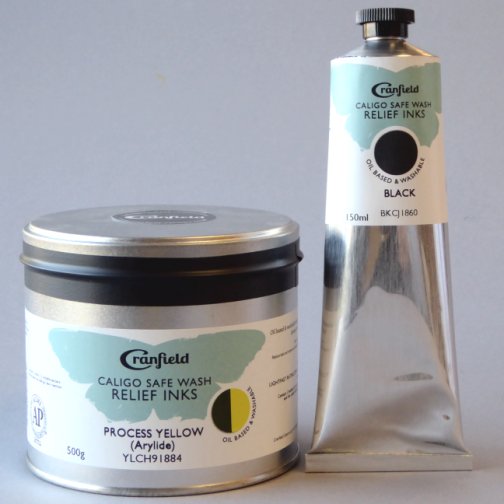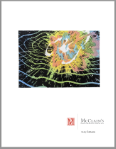
Caligo Safe Wash Relief Ink
- Oil-based ink for all relief techniques including woodcut, linocut, monotype, engraving and Solarplate
- Soap and water clean up - no solvents required
- Available in a wide range of colors
- Ink will not reactivate with water after it is fully dry
- Lightfast and highly pigmented
- Excellent for any studio where solvents cannot be used
Caligo Safe Wash Relief Inks will handle and print like any traditional oil based ink but these inks have been formulated so they can be safely and easily washed away with soap and water. You don't need solvents to clean up Caligo Safe Wash Relief Inks.
These inks are heavily pigmented. To extend the ink or make it more transparent, add Caligo Safe Wash Relief Ink Extender. To thin the ink so it spreads easily, add Caligo Safe Wash Oil (Thinner) or #000 Burnt Plate Oil. Caligo Safe Wash Oil contains the same emulsifier that allows for soap and water clean up. If you use #000 Burnt Plate Oil, use as little as possible or you may lose the ability to clean up with soap and water. Add any thinner sparingly since details may be lost if the ink becomes too fluid. Tack Reducer is a transparent gel made from a very light drying oil. Adding small amounts to the ink will reduce tack so the ink spreads out more readily and evenly. Gamblin Magnesium Carbonate stiffens the ink and reduces the ink's gloss level. To speed up drying time, add Cranfield Wax Drier. Mix up to 3% of the Wax Drier paste into the ink on the slab with an ink knife. This modifier will reduce drying time and improve mark and rub resistance of the dried print surface. Test for suitability before using on a large scale, multi-color or reduction print.
All of the inks except for Light Orange, Burnt Sienna and Raw Umber are made from single, pure pigments, meaning they are excellent for mixing your own vibrant colors.
The inks can be printed on dry or damp paper. Since they are designed to emulsify in soap and water, it is recommended that you keep your paper fairly dry and make sure there is no surface water on the paper.
Caligo Safe Wash Ink dries by oxidation and polymerization. The ink will dry most efficiently if it is printed on absorbent, acid free paper and allowed to dry in a warm and dry environment. The inks contain a very small amount of driers, less than 1%. If you wish to speed up the drying process you can safely add up to 0.5% liquid cobalt or manganese drier.
Clean up
Clean up is safe and easy.
First remove as much ink as possible by rolling the brayers on newsprint and scraping away any ink left on glass slabs with an Allway Scraper.
Apply a layer of liquid soap (no water yet) to the inky surfaces and work it in with a nail brush. You will see the ink breaking down as it mixes with the soap. When all of the ink is loose, wash under warm water, using the brush to help lift and carry away any remaining ink.
If any stubborn patches of ink remain, dry the surface with a paper towel, work in more soap and wash again.
Water alone sometimes causes the ink to cling so remember the rule "soap before water!" Carefully dry all tools and surfaces before final storage.
| For more information about using Caligo Safe Wash Relief Ink, click here: |

|



About Caligo Inks
An independent, family-owned business, Caligo has been serving printers for over 30 years and offers an extensive line of high quality artists' printmaking inks.
Traditional oil-based printing inks for all the traditional printmaking processes are manufactured, including intaglio (etching, aquatint etc.), relief printing (lino cut, wood cut, wood engraving, flexography, monoprint and letterpress) and offset or direct lithographic printing (from stone, metal or from photographic plates). They also make inks for specialist printmaking applications such as collotype printing as well as letterpress inks for artists' books.
The factory provides an ideal setting for the manufacture of high quality printing inks. Working with pigments ranging from the strong, vibrant colors of the modern organics to the more muted tones of the natural earths, high-speed mixers disperse the dry pigments into a range of mediums such as traditional copper plate stand oils and linseed oil. From there the ink goes to the water-cooled triple roll mills which grind the pigment dispersions until the average size of pigment grains have reached a pre-approved standard for that ink. After a series of quality checks the finished ink is dispensed into containers.
Inks are constantly tested for strength, color, tack, drying time, printability, viscosity, fineness of grind and lightfast rating. An ink standard is kept for each ink to make sure that the inks remain consistent from batch to batch and from year to year.
Caligo Inks' aim is to develop inks that meet the needs of their end users and they make every effort to make sure their inks are tested and approved by fine art printmakers.
Caligo holds the ISO 14001 Quality Standard for the environment. In 1999, Caligo Inks was recognized as the Welsh 'Small Environmental Company of the Year' for the development of their environmentally friendly Safe Wash Inks.

